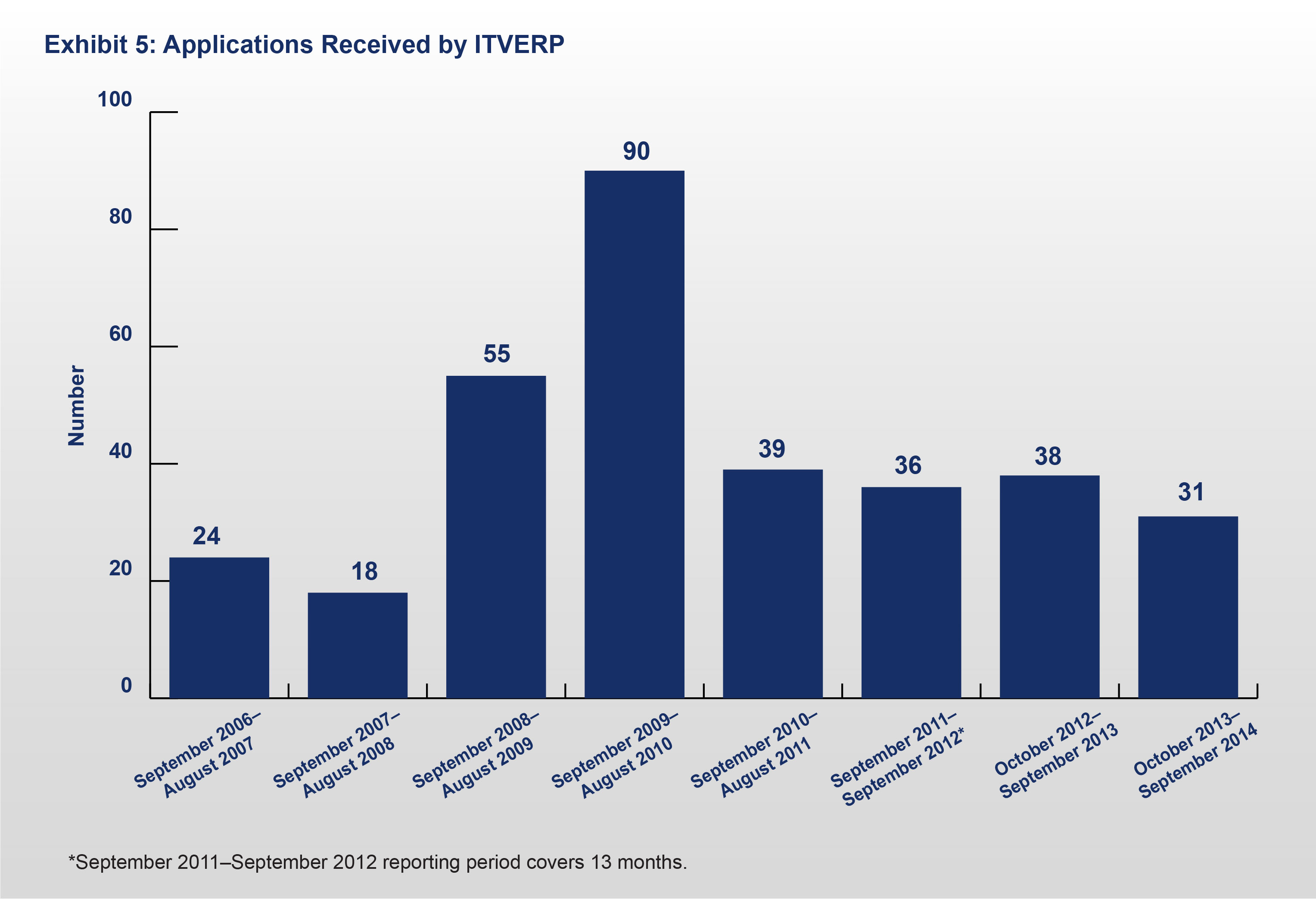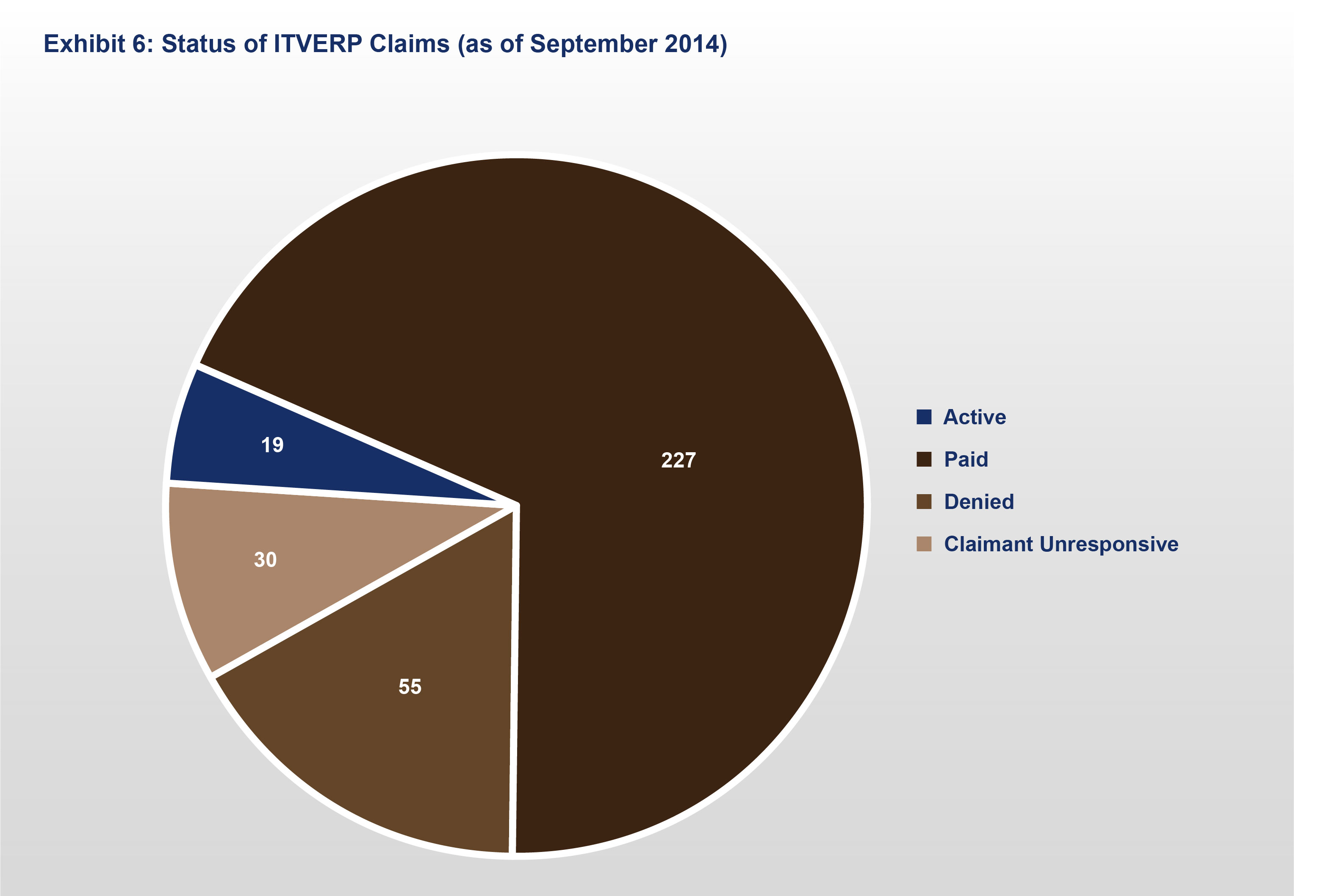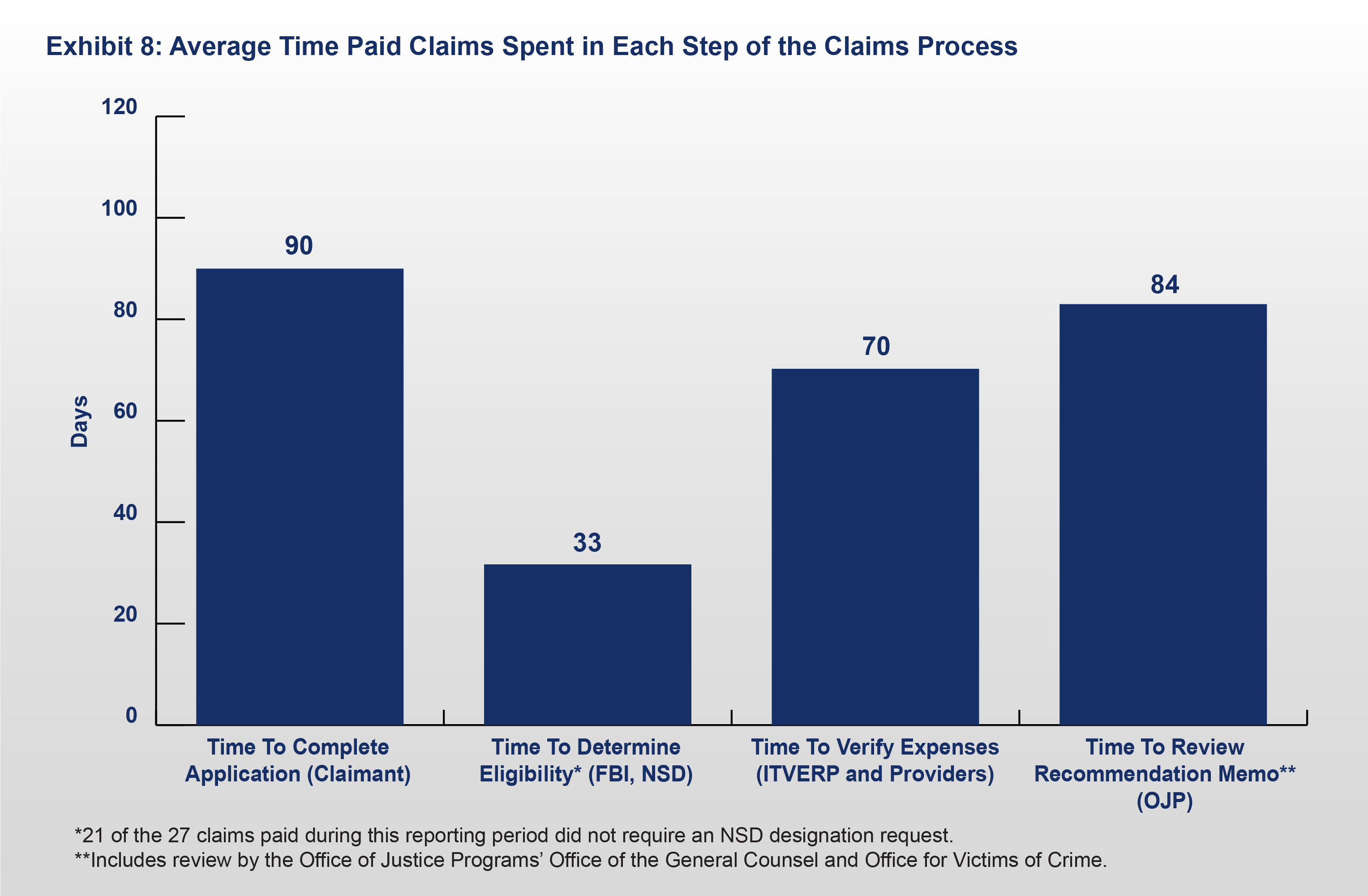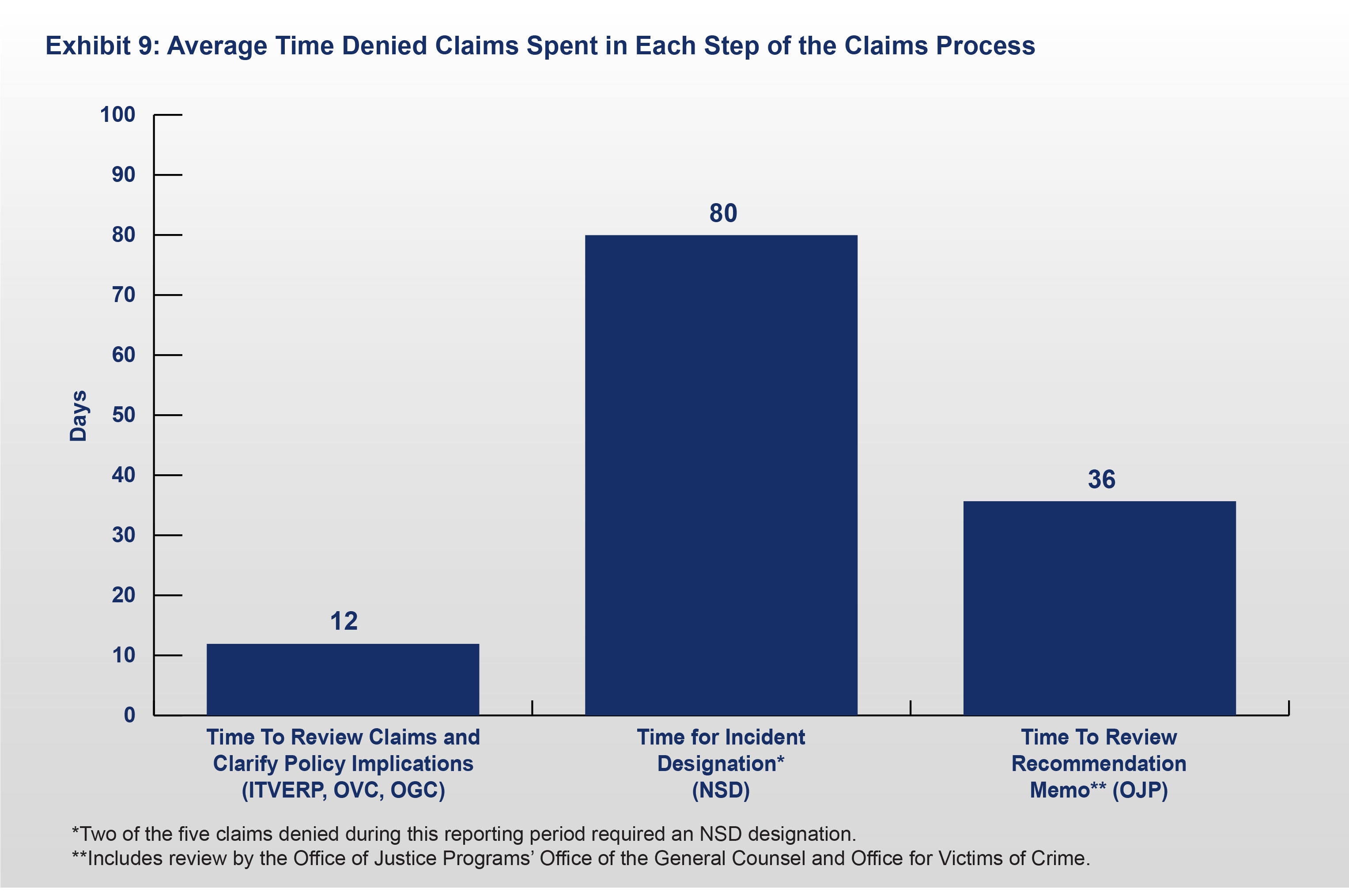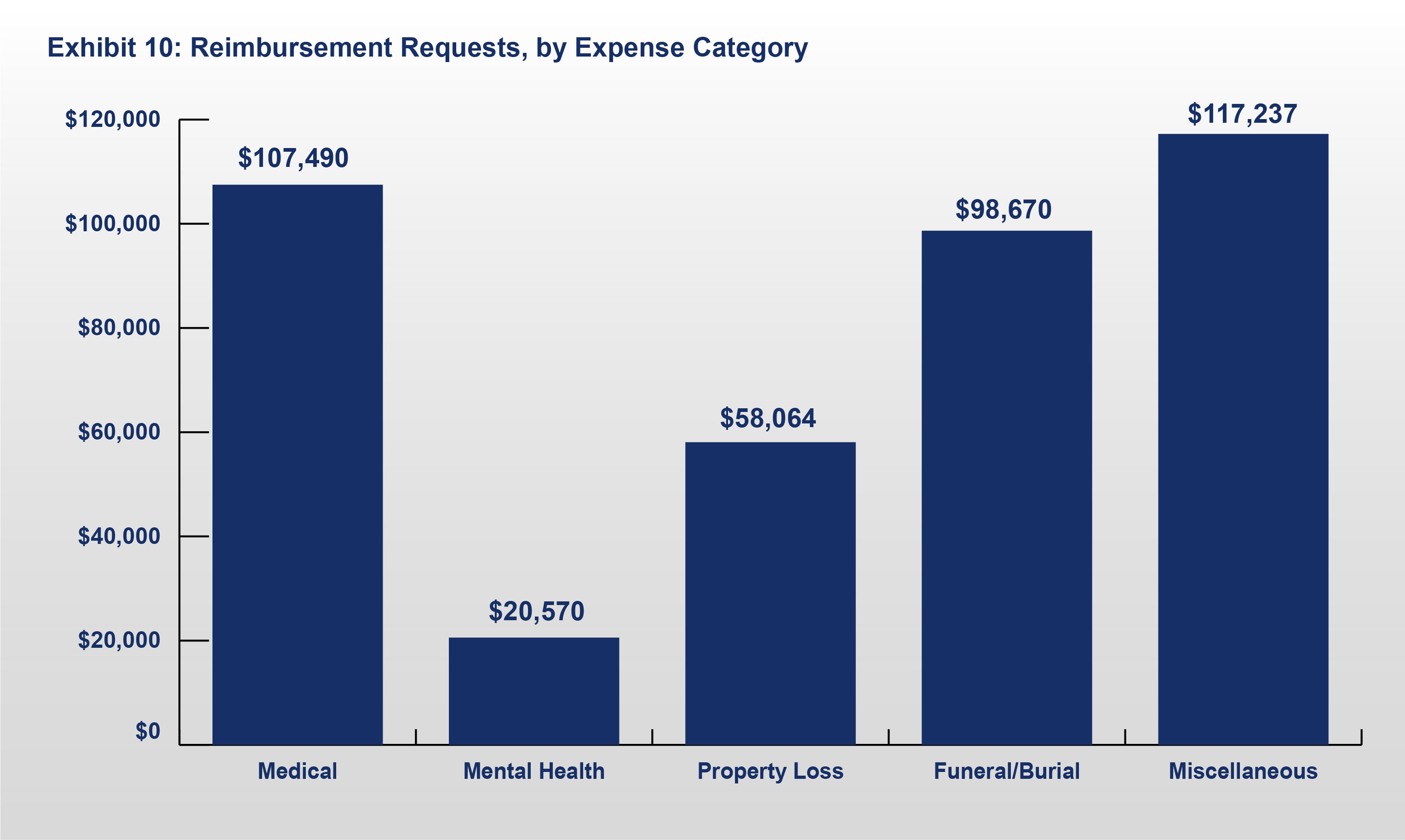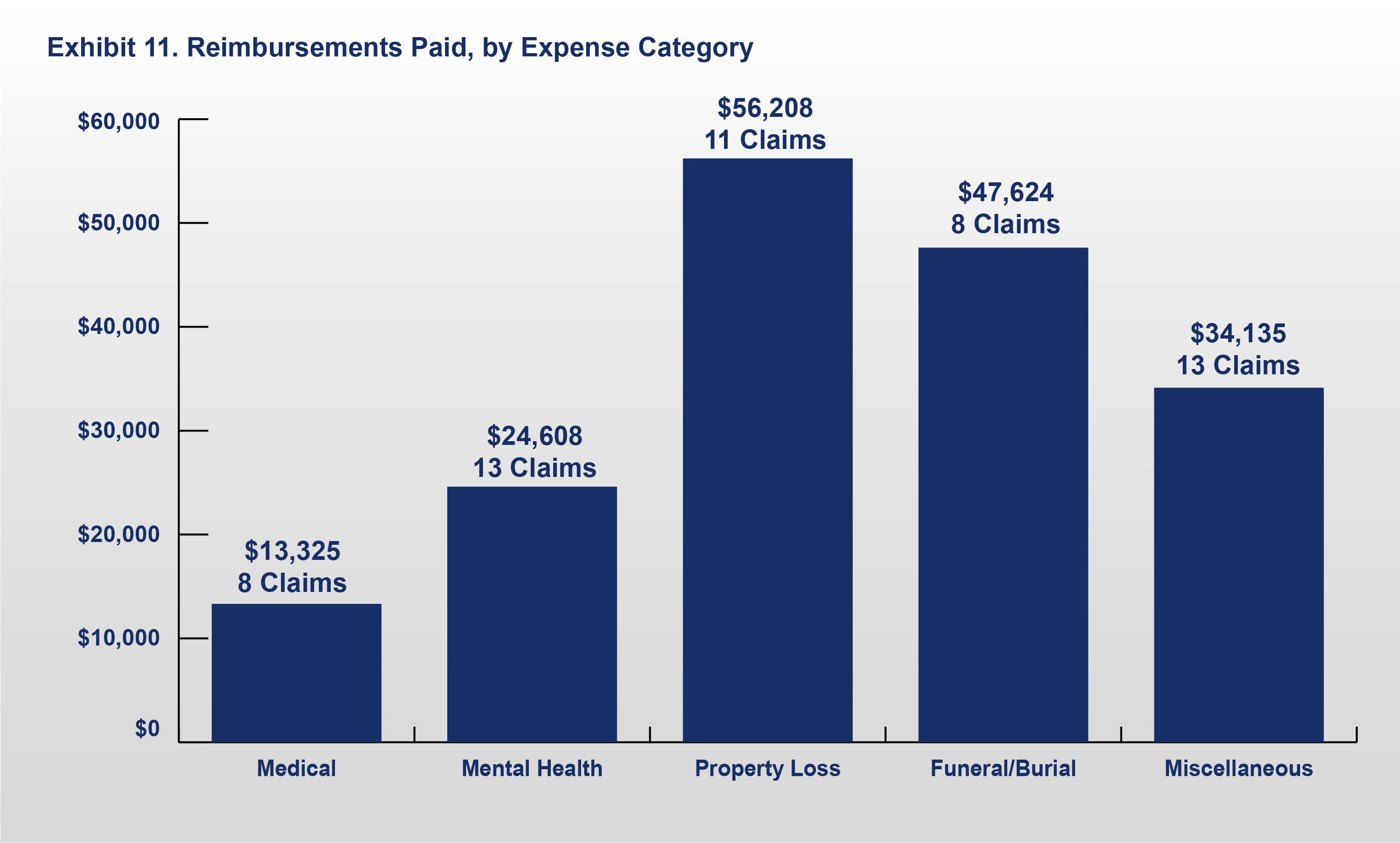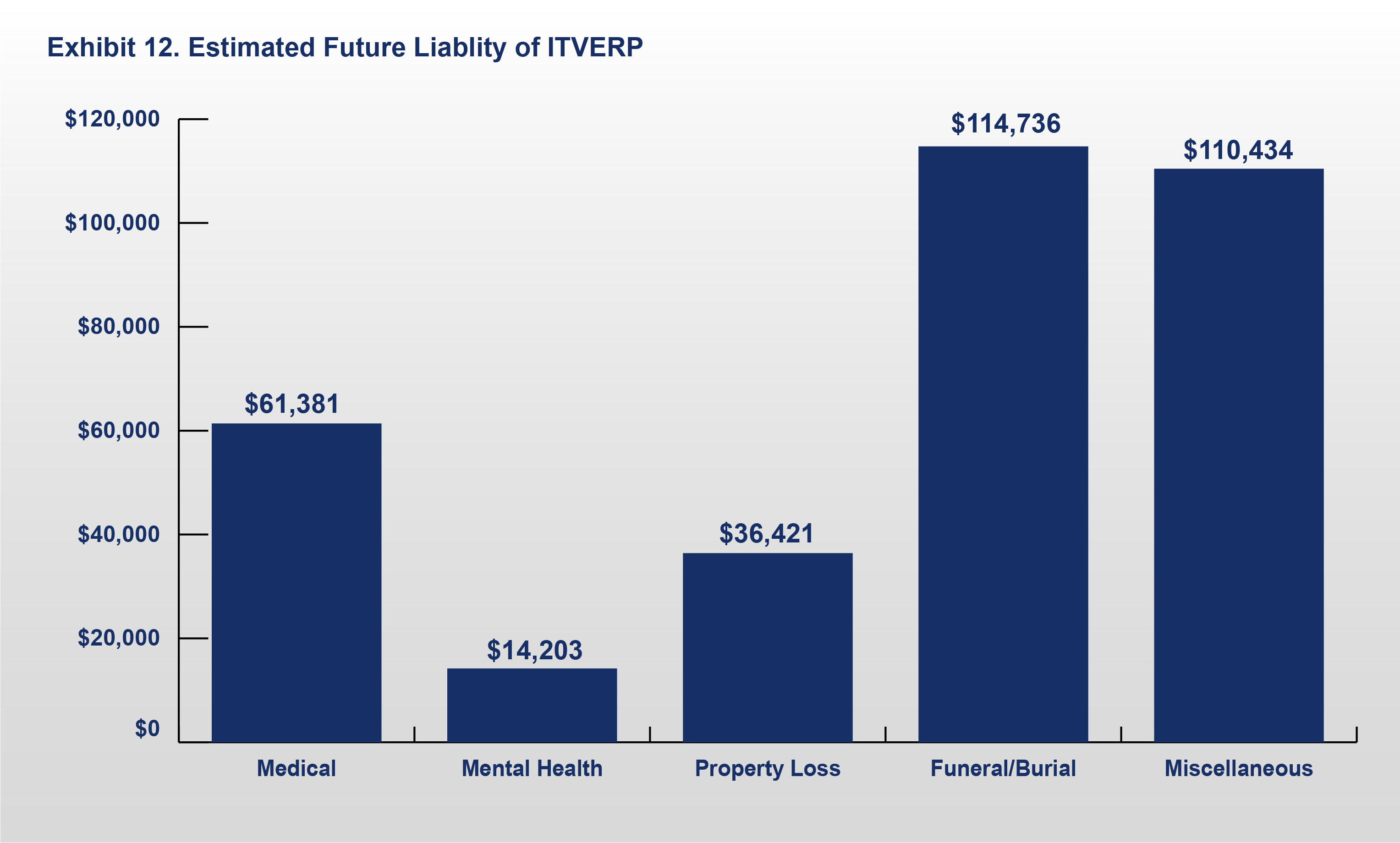ITVERP Assistance and Outreach
This report provides a summary of the International Terrorism Victim Expense Reimbursement Program’s (ITVERP) activities from October 1, 2013, to September 30, 2014. It covers two critical areas of ITVERP assistance—application processing and claims payment, and public awareness activities undertaken to reach potential claimants—and concludes with a discussion of future program needs and suggested improvements.
Program Highlights
- ITVERP began utilizing the Claimant Feedback Tool to obtain information about the application and claims review process.
- OVC and the Office of Justice Programs’ Office of the Chief Information Officer continued working together to develop a more comprehensive case management system.
- ITVERP increased outreach to foreign victims and surviving nuclear family members.
- ITVERP increased collaboration with other federal agencies for victims and surviving family members of current terrorist incidents.
Reimbursement Activities
This section highlights the activities and accomplishments related to ITVERP’s main function of processing applications for reimbursement, including—
- the number of applications received;
- the status of claims;
- the current processing time for claims;
- details regarding reimbursements paid to claimants; and
- the number of appeals under the program to date.
Applications Received and Processed
During this reporting period, ITVERP received 31 new applications for reimbursement. The applications reflect terrorist incidents dating from September 4, 1997, to April 24, 2014. Exhibit 5 illustrates the number of applications received during each ITVERP reporting period since the program’s inception in 2006.
Status of Claims
As claims proceed through the application process, the Office for Victims of Crime (OVC) assigns them one of four related statuses:
- Active. Claims may be in process while OVC verifies eligibility, expenses, and gathers additional information; or active pending designation by the National Security Division (NSD).
- Claimant Unresponsive. Frequently, claimants initiate the application process but do not provide complete information. Claimants have 120 calendar days from the time ITVERP receives their initial application to provide the necessary information or the claim will become inactive.
- Denied. A claim is considered denied if the OVC Director determines that no reimbursement may be paid. Such claims are also considered inactive.
- Paid. A claim is considered paid after a claimant receives reimbursement. Once a claim is paid, it is also considered inactive.
At the end of this reporting period, there were 19 active claims: 13 claims in process and 1 claim pending designation by NSD. ITVERP paid 227 claims, denied 55 claims, and designated 30 claims as claimant unresponsive (inactive) since the implementation of the program in 2006. Exhibit 6 presents the status of all ITVERP claims.
Claims From Foreign Service Nationals
During this reporting period, ITVERP did not receive any claims from Foreign Service Nationals.
Processing Time
To process claims, ITVERP requires verification of the claimant’s eligibility and confirmation that the expenses submitted have been processed in compliance with ITVERP regulations. Generally, claims that are denied because of claimant ineligibility require less time to process because ITVERP’s claim review is not contingent upon completion of the application or expense verification. However, depending on the reason for the denial, claims may undergo victim verification and the incident designation process before being denied. For example, if victim verification requires coordination with an investigating agency other than the Federal Bureau of Investigation (FBI), it may take time to identify the agency responsible for verification. Also, if an incident is submitted to NSD for designation as an act of terrorism, it may take time for NSD to determine whether the incident qualifies as a terrorist act for the purpose of ITVERP. Each of the scenarios described above may affect review time. Exhibit 7 shows the average length of time it took to process the 27 paid claims and 5 denied claims completed during this reporting period.
Exhibits 8 and 9 show the average number of days it took for paid and denied claims to move through different steps in the claims process.
Reimbursement Requests, by Expense Category
Potential claimants who incurred multiple expenses as a result of their victimization may apply for reimbursement in more than one expense category. ITVERP case managers work closely with claimants and potential claimants to fully identify their needs to ensure they receive the maximum reimbursement allowable. Exhibit 10 shows the dollar amount of reimbursements requested in the 31 new applications received during this reporting period, by expense category. Many claimants applied for reimbursement under multiple expense categories.
Reimbursements Paid, by Expense Category
During this reporting period, ITVERP paid a total of $175,900.17 in reimbursement requests. Exhibit 11 shows the dollar amount of reimbursements paid to the 27 claimants by each expense category during the reporting period. Some claimants were reimbursed in multiple expense categories.
Appeals
Under ITVERP regulations, claimants may file an appeal within 30 days of receipt of the OVC Director’s determination of their claim. Since the inception of the program, ITVERP has received only one appeal. No appeals were filed during this reporting period.
Future Liability
Claims that are in process represent an estimate of ITVERP’s potential future liability. If all the claims that are in process are paid in the amounts requested, ITVERP’s potential future liability is $337,175.23. Exhibit 12 shows ITVERP’s estimated future liability by type of expense reimbursement category.
Program Updates
Deadline Extensions
The OVC Director is authorized to use discretion to extend the filing deadline for ITVERP applications based on a showing of good cause. Of the 31 new applications received during this reporting period, one extension of the 3-year filing deadline was requested, and was granted upon a showing of good cause.
Supplemental Claims
Claimants who have received reimbursement for their itemized claim are eligible to file a supplemental claim for their ongoing expenses related to the incident. Three of the 31 claims received by ITVERP during the reporting period were supplemental claims.
Promoting Public Awareness
Victims of terrorism must focus on their immediate medical, mental health, family, housing, and other needs and those of their loved ones. Unfortunately, many victims and their families are not aware of the resources available to them. A critical ongoing effort for ITVERP is to reach out to victims of international terrorist incidents and their families to inform them of the assistance this program offers. Outreach activities are primarily focused on two specific groups: victims, survivors, and families of terrorism victims who are considered potential claimants; and collaborating agencies and organizations that may come into contact with potential claimants. This section describes ITVERP’s outreach efforts during this reporting period.
Outreach to Potential Claimants
ITVERP’s outreach efforts focus on victims of international acts of terrorism and their family members who may be eligible for reimbursement under the program. OVC coordinates with the Office for Victim Assistance (OVA) within the FBI and the U.S. Department of State (DOS) to identify potential claimants. When terrorism incidents occur outside of the United States, DOS is the first agency to respond, locating and identifying U.S. citizens. In the aftermath of an incident and when appropriate, OVA provides victims or their families with information about ITVERP as a potential resource. For the victims and family members who choose to apply for benefits, ITVERP case managers verify eligibility and deliver support and assistance throughout the application intake and claims verification process. During this reporting period, ITVERP sent individual outreach letters to 53 potential claimants.
ITVERP received and processed four claims in this reporting period by claimants who were kidnapped. ITVERP provided outreach to more direct victims or surviving family members from this type of terrorist incident. ITVERP was proactive in working with OVA to obtain contact information for, and provide direct assistance to, victims or surviving family members of kidnapping, which is a trending type of terrorism.
Recognizing that many family members can be affected by the loss of a loved one, ITVERP also created an initiative to raise awareness among nuclear family members who may have incurred expenses as a result of a terrorist incident, and are eligible for reimbursement through the ITVERP program. For example, a family had several members killed and injured in a terrorist incident. When OVA connected the family to an ITVERP case manager, 10 family members had incurred costs from two funerals and memorial services and were incurring ongoing medical expenses resulting from the incident. Because of the complexity of filing two claims under the same claimant for two different relatives, and linking each expense to the appropriate claim, ITVERP worked closely with the family members. First, providing them guidance on ITVERP regulations for what expenses were eligible for reimbursement (especially under the funeral and burial category), and second, affirming who is eligible to file claims for mental health expenses. This outreach effort resulted with the family submitting four of the five itemized claims in this reporting period. ITVERP has continued to work closely with the family members who are submitting the last itemized claim and supplemental claims for ongoing expenses.
ITVERP Incoming and Outgoing Contacts
Helpline Calls: ITVERP received 471 calls and made 312 calls.
Emails: ITVERP received 1,033 emails and sent 906 emails.
Outreach to Collaborating Agencies and Organizations
Another goal of OVC’s outreach efforts is to educate the victim assistance community about ITVERP, including collaborating agencies and potential partners. By reaching out to branches of the military and international nongovernmental organizations (NGOs), and individuals who may come into contact with victims of international terrorism, OVC increases awareness about ITVERP and the financial support available.
During this reporting period, ITVERP conducted direct outreach, updated contact information, and provided program materials to 10 international NGOs: Africare, American Red Cross, Catholic Relief Services, Doctors Without Borders, International Committee for the Red Cross, Care International, Lutheran World Relief, Mercy Corps International, Oxfam America, and Save the Children.
ITVERP Resource Center
The ITVERP Resource Center responds to questions and requests made through its dedicated toll free helpline and email address. Program staff are available to respond to inquiries Monday through Friday from 8:30 a.m. to 5:30 p.m. eastern time. Federal, state, and local government agency staff and NGOs contact the Resource Center on behalf of specific individuals for information about the program’s eligibility requirements and to inform the center about potential claimants who may qualify for ITVERP reimbursement.
ITVERP has increased assistance to potential foreign claimants who received ITVERP information from a U.S. Embassy or an FBI liaison. In this reporting period, ITVERP assisted claimants from the Philippines, China, Libya, and Thailand who were not affiliated directly with the U.S. Government abroad. In one case, a Chinese national inquired about filing on behalf of her deceased husband who was a U.S. citizen. All correspondence between ITVERP and the potential claimant was done over email in English, once it was established that the claimant was comfortable communicating in this language; however, all receipts submitted with her claim required translation from Mandarin into English for verification purposes. ITVERP utilized Language Line translation services to verify the expenses submitted by the claimant.
Similarly, ITVERP staff respond directly to victims who call the helpline for assistance with their applications, inquiries about the types of expenses the program covers, and the program’s eligibility requirements. For non-English speakers, the program provides translation support. ITVERP staff use their individual language capacity if the caller speaks Spanish. For other languages, the staff access the Language Line for assistance in communicating effectively with any caller or claimant. This allows for real-time communication with the caller. During this reporting period, ITVERP accessed the Language Line to obtain verification from medical providers who spoke only Arabic and Italian.
ITVERP Customer Service
Enhancing customer service and communicating with claimants continue to be program priorities. OVC’s focus on customer service will include reviewing the mechanisms available to ITVERP to improve claims processing times and staff communication with victims and families applying for reimbursement. During this reporting period, ITVERP utilized the Claimant Feedback Tool to obtain information about the application and claims review process from 17 claimants. All of the claimants responded with positive feedback regarding their overall experience with the ITVERP program, highlighting that the constant communication with their case manager was extremely helpful in the long process. Six of the claimants indicated that the most challenging part of their experience was collecting the supporting documentation needed to process their claim. However, they understood its necessity for verification purposes.
As a further enhancement in customer service, OVC and the Office of Justice Programs’ Office of the Chief Information Officer (OCIO) continue to work closely together to develop a more comprehensive case management system. In this reporting period, OCIO completed the development of the intake portion of the new system for external users to submit an ITVERP claim. After testing the intake portion as an external user, OVC provided feedback to OCIO that included proper descriptions and user work flow improvements. Once completed, the new system will enhance service delivery to applicants by providing greater transparency in the ITVERP claims process for victims and by allowing them to submit applications and track their individual claims online. It will also afford program staff the increased capacity to enhance customer service delivery.
Future Program Needs and Improvements
Complexity of Claims
As a reimbursement program, ITVERP is not a typical claims or compensation program. ITVERP is unique because it requires significant due diligence and review of each expense before reimbursement can occur. This adds complexity to the program and requires continual navigation of new issues arising from uncommon and sensitive reimbursement requests. In this way, ITVERP is a program where the quality of the analysis and resulting claim determination is paramount, and swift processing is not always possible. As new claims continue to be submitted, the program will continue to develop and evolve, as will the resulting policy decisions.
Outreach
ITVERP is also continually conducting outreach to ensure that potential claimants are aware of this unique program. ITVERP must promote the program among governmental and nongovernmental agencies on an ongoing basis and conduct consistent outreach by attending conferences and meetings and building relationships with other organizations. Such exposure is essential to ensuring that organizations that come into contact with victims are aware of the ITVERP program and can refer potential claimants to its resources.
Recognizing that many claimants file supplemental claims for ongoing mental health services, ITVERP will launch an outreach initiative to claimants who were reimbursed for mental health expenses in their itemized claim. This initiative will enhance customer service efforts as ITVERP provides continued assistance to victims and their families in the aftermath of international terrorist incidents.


